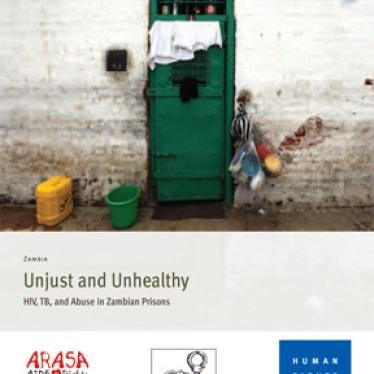Today is World AIDS Day, and the theme this year is ‘Universal Access and Human Rights.’ Zambia is ahead of much of the world on the first half of this theme: In August 2005 the Ministry of Health pledged to provide free antiretroviral medicine to all who need the drugs.
Zambia’s track record in respecting human rights in the response to AIDS is more uncertain. People living with HIV still face stigma and discrimination, and some groups have yet to be included in the government’s pledge of ‘universal’ access. Prisoners, for example, have little access to HIV prevention or treatment, and they struggle to have their rights respected and protected.
Prisons lack HIV and TB services
Around one in seven Zambian adults are infected with HIV. Among prisoners, one in four are. While some progress has been made in recent years in expanding HIV testing and treatment in prisons, largely with the help of CHRESO Ministries—a faith-based non-profit organisation—much work remains to be done. In addition, between 15 and 20 percent of prisoners likely have tuberculosis (TB). For them, there are even fewer chances for effective treatment.
In April, Human Rights Watch, the AIDS and Rights Alliance for Southern Africa (ARASA), and the Prisons Care and Counselling Association (PRISCCA) released a report detailing prison health conditions in Zambia. We interviewed almost 250 prisoners in six prisons, as well as prison officers and Zambia Prisons Service officials.
The results were bleak. We found that no prison-based TB testing and treatment exists, and HIV services are available only at a few prisons. Security concerns, lack of transportation, and the decisions of officers who have no medical training prevent many prisoners from getting critical, life-saving medical care.
Mwamba, a 26 year-old at Mwembeshi Prison, put it simply: “Here, there is no medicine.”
Signs of progress
Since our report was released, the Prisons Service has started to address some of the key issues. A pilot programme between the Centre for Infectious Disease Research in Zambia, the U.S. Centers for Disease Control, and the Prisons Service is beginning to screen prisoners for TB at select prisons as they enter the system and as they leave, linking them to care both while they are in prison and after their release. The target of testing 10,000 prisoners within a year is ambitious, and the initiative highly commendable.
The president has appointed Percy Chato as the new commissioner of prisons. Mr Chato is the former HIV/AIDS focal point person for the prison system and is well aware of the urgent need to address HIV in prisons. At the same time, increased funding for the prison medical directorate is finally becoming available to combat HIV: The Global Fund to Fight AIDS, Tuberculosis, and Malaria is providing 3.7 billion kwacha to the Zambia Prisons Service over two years to fund HIV prevention activities.
Remaining challenges
But even in the face of such hopeful signs, certain challenges remain. Current funding from the Global Fund has been under review because of allegations of fraud within the Ministry of Health, and future funding may be at risk. Disbursements were frozen last year, and the United Nations Development Programme (UNDP) has stepped in to take over management of the grants originally provided to the Ministry of Health.
Certainly, UNDP has many priorities in maintaining existing programmes, but they should also ensure that Global Fund money for treatment provides care for prisoners.
The Zambia Prisons Service should justify how it can focus on HIV prevention but not address the fundamental reasons for HIV transmission. 3.7 billion kwacha is a lot of money to spend on training and education. With this funding, the Prisons Service should ensure that condoms are available to prisoners, and should begin to address the issue of prison overcrowding.
As long as prisoners remain in horribly overcrowded cells—sleeping in shifts or seated—disease will continue to spread, even when medical care is available. In November, across the country, 15,669 prisoners were crowded into prison space originally designed for 5,500.
Basic criminal justice reforms are essential to stem the tide of prisoners into the Prisons Service’s packed cells. Arbitrary arrests and the lack of bail and legal representation contribute to extended pre-trial detention. So do the lack of non-custodial alternatives and parole for those with minor sentences. A lengthy appeals process contributes to overcrowding as well.
Several international donors have provided the Lusaka-based organisation PRISCCA with funding to begin offering human rights education in the prisons and to hire lawyers to help address the backlog of pre-trial cases. But the scope of the problem remains immense, and both law reform and additional funding are required if prison overcrowding is going to be adequately addressed.
Prisoner health is public health
If Zambia is going to conquer HIV and TB, it needs to recognise that ‘prisoner health is public health.’ Prisoners—and prison staff—enter and leave Zambian prisons every day. Unless HIV and tuberculosis are addressed in prisons, efforts to address both diseases in the community will fall short. More fundamentally, by addressing the needs of prisoners, the Zambian government could also achieve its headline goal—to provide universal access to HIV prevention and treatment—and become recognised as a leader in the global fight against AIDS.
This World AIDS Day, more than ever, is the time to recognise the importance of human rights in achieving true universality of access to testing and treatment, and in combating the spread of HIV. Only by addressing the needs of prisoners—for health services and for just and humane prison conditions—will the epidemic be beaten. It is a matter of fairness, rights, and ultimately the health of all Zambians.







